Exertions, the blog of the Society for the Anthropology of Work, has published a new series of posts entitled “Policing and Labor.” Many wonderful people have contributed to it, so I suggest you check it out. My own, “What is the ‘Work’ in ‘Police Work’,” briefly explores some of the political valences of the concept of “work” amidst the police reforms that are the subject of my upcoming book The Police Against Itself. Here’s more or less the punchline:
Viewed in this light, policing was to achieve economic efficiency and accountability of action for individual police officers through a series of organizational reforms that rewarded merit as measured through “work.” This could mean ratios of arrests or interpellations per work hour, but also territory covered per shift (as measured through new technologies of GPS tracking), reports written, and complaints cleared. Amid all of this activity and its bureaucratically legible evidence, “social” activities were comparably amorphous and could not, therefore, count toward results. The police de proximité, for Sarkozy, was literally not work. What was needed, he argued, was a strategy to get police officers working—to motivate them to do things. As opposed to the police de proximité, Sarkozy’s program explicitly rejected the terrain of the social as either a legitimate or useful object of policing. Instead, it offered the instauration of a series of high-stakes auditing and actuarial practices in order to reorient police work itself.
Karpiak, K. G. (2020). What is the “Work” in “Police Work”? Society for the Anthropology of Work. https://doi.org/10.21428/1d6be30e.e70cf108

